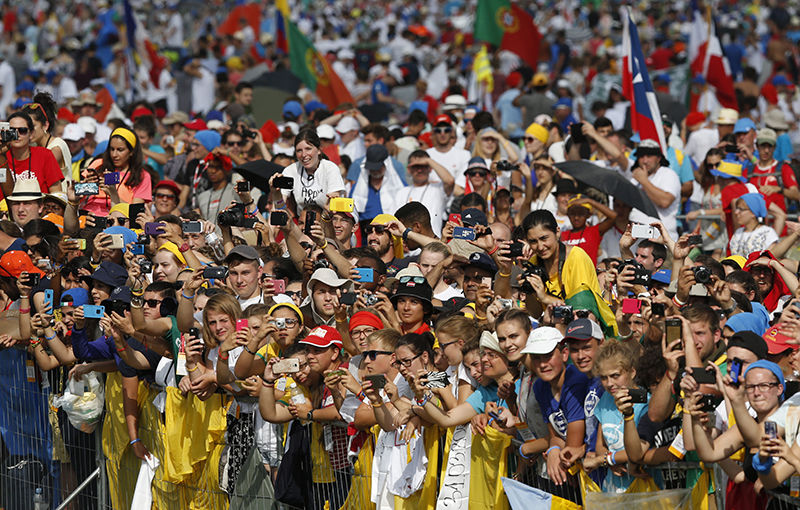KRAKOW, Poland — World Youth Day, a massive gathering of Catholic youth from all across the planet that’s sometimes tongue-in-cheek been dubbed the “Catholic Woodstock,” took place in Krakow, Poland, July 25-31, bringing together what organizers estimated at two million people for a festival of fun, food and faith.
Consider what had taken place in the world in just the month before those young people descended on Krakow. This, by the way, is merely a partial list.
› In Bahrain on July 1, militants detonated a bomb that killed a woman and three children.
› Also on July 1, gunmen on the West Bank fired at a passing vehicle, killing a Jewish yeshiva head and injuring his wife and children.
› On July 2, gunmen linked to the radical Islamic group al-Shabaab launched 11 mortars at civilian targets in Somalia, killing two young girls aged four and five and injuring 19 civilians.
› On July 3, at least 325 people were killed and 245 injured in a series of coordinated bombings in Baghdad.
› On July 4, Islamic State militants kidnapped 40 civilians in a Syrian town in Aleppo province and later executed them for trying to escape.
› Five police officers in Dallas were killed and seven others wounded on July 7, in an attack motivated by rage over police shootings of black males by police in various U.S. locales.
› At least 36 people were killed on July 9 and 143 people injured after mortar and other attacks in Aleppo, Syria, carried out by rebel terrorist groups.
› On July 14, 84 people were killed and 308 injured when a 31-year-old Tunisian man drove a truck through a crowd celebrating France’s Bastille Day, in an incident that also left the attacker dead.
› In Baton Rouge, Louisiana, a July 17 ambush on police left three people dead and three others injured.
› The next day, an assault on a police station in Almaty, Kazakhstan, left six people dead and eight others injured.
› In Würzburg, Germany, an attack on a train carried out by an axe-wielding 17-year-old Afghan asylum seeker left five people injured, two of them critically, and the attacker dead.
› On July 26, a 26-year old broke into a Japanese hospital and stabbed 44 people, killing 19, almost all of them disabled, and then surrendered to the police claiming that people with disabilities need to disappear.
› On the same day, Islamic State-inspired assassins slit the throat of a Catholic priest and seriously wounded a woman in a church in Normandy, France, and were themselves killed by French security forces.
In all, 1,843 people have perished as a result of terrorist actions in July, according to statistics collected by Wikipedia, and that doesn’t count the totals from incidents in which the number of dead are listed as “unknown.”
Thus when Pope Francis talks about a world war being fought today in piecemeal fashion, one understands that the image isn’t fanciful but a brutally accurate description of contemporary reality.
In the context of such carnage, such an apparent contagion of madness, where can hope be found? In all honesty, the last week of July made the case for hope in eloquent fashion with the World Youth Day gathering in Krakow.
Why?
For one thing, the spirit in Krakow was relentlessly upbeat. While the Islamic State and other terrorist organizations are able to recruit small numbers of young people into their deadly campaigns, hundreds of thousands of Catholic youth from all across the planet came together in the streets of a major European city this week and left no destruction behind, but rather indelible images of friendship and fraternity.
For another, World Youth Day went ahead despite apprehensions about security threats. The presence of police and military throughout the week was palpable but never overweening or distracting, and every night, late into the night, young revellers filled up the squares and parks of the city as if their team had just won the Super Bowl or the World Cup.
In effect, this was a vast throng of loving, caring, positive young people saying to the Islamic State and the other wreakers of havoc in the early 21st century, “We refuse to be terrorized.”
As opposed to other scenarios of large-scale mobilizations one might imagine, crime rates in Krakow plummeted last week, garbage collections declined as these young pilgrims picked up after themselves, and locals were left smiling and delighted with the positive energy coursing through the city.
Finally, these young people exuded a different vision for the future of humanity, one based on a global solidarity, respecting differences of class, race and culture without viewing them as divisive, and embracing religion not as the problem but as the wellspring of the solution.
“Our response to a world at war has a name: its name is fraternity, its name is brotherhood, its name is communion, its name is family,” Pope Francis told the roughly one million youth gathered for a prayer vigil Saturday night.
“We celebrate the fact that coming from different cultures, we have come together to pray. Let our best word, our best argument, be our unity in prayer,” he said.
That might sound like hollow rhetoric, but if you had been in the streets and squares of Krakow in late July, you would understand that it’s not artifice or a pious aspiration, but the living, beating heart of an honest-to-God youth army — in this case, an army dedicated not to violence or hatred, but to hope.
This article originally appeared at the Catholic news site cruxnow.com

